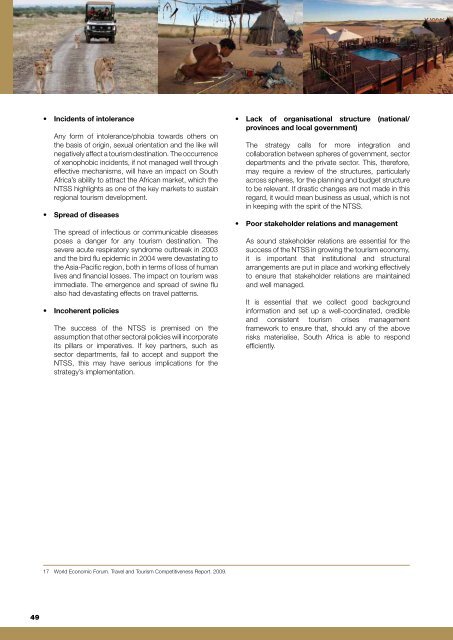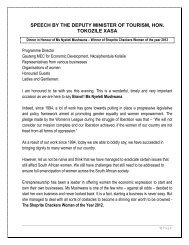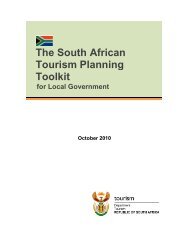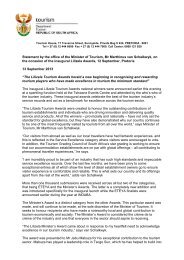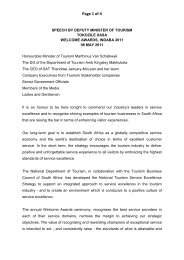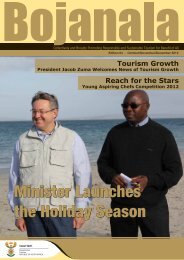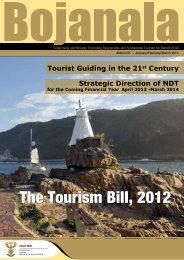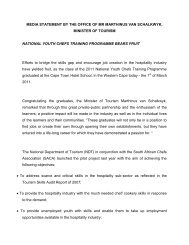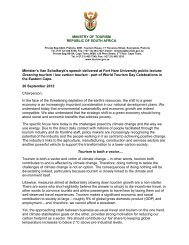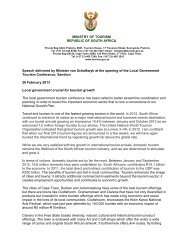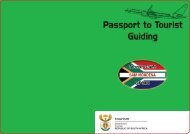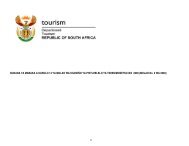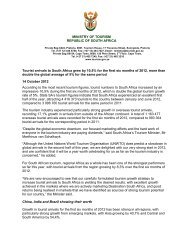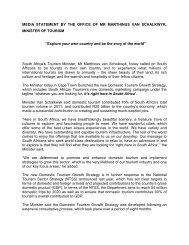• Incidents <strong>of</strong> intoleranceAny form <strong>of</strong> intolerance/phobia towards others onthe basis <strong>of</strong> origin, sexual orientation and the like willnegatively affect a tourism destination. The occurrence<strong>of</strong> xenophobic incidents, if not managed well througheffective mechanisms, will have an impact on SouthAfrica’s ability to attract the African market, which theNTSS highlights as one <strong>of</strong> the key markets to sustainregional tourism development.• Spread <strong>of</strong> diseasesThe spread <strong>of</strong> infectious or communicable diseasesposes a danger for any tourism destination. Thesevere acute respiratory syndrome outbreak in 2003and the bird flu epidemic in 2004 were devastating tothe Asia-Pacific region, both in terms <strong>of</strong> loss <strong>of</strong> humanlives and financial losses. The impact on tourism wasimmediate. The emergence and spread <strong>of</strong> swine flualso had devastating effects on travel patterns.• Incoherent policiesThe success <strong>of</strong> the NTSS is premised on theassumption that other sectoral policies will incorporateits pillars or imperatives. If key partners, such assector departments, fail to accept and support theNTSS, this may have serious implications for thestrategy’s implementation.• Lack <strong>of</strong> organisational structure (national/provinces and local government)The strategy calls for more integration andcollaboration between spheres <strong>of</strong> government, sectordepartments and the private sector. This, therefore,may require a review <strong>of</strong> the structures, particularlyacross spheres, for the planning and budget structureto be relevant. If drastic changes are not made in thisregard, it would mean business as usual, which is notin keeping with the spirit <strong>of</strong> the NTSS.• Poor stakeholder relations and managementAs sound stakeholder relations are essential for thesuccess <strong>of</strong> the NTSS in growing the tourism economy,it is important that institutional and structuralarrangements are put in place and working effectivelyto ensure that stakeholder relations are maintainedand well managed.It is essential that we collect good backgroundinformation and set up a well-coordinated, credibleand consistent tourism crises managementframework to ensure that, should any <strong>of</strong> the aboverisks materialise, South Africa is able to respondefficiently.17 World Economic Forum. Travel and <strong>Tourism</strong> Competitiveness Report. 2009.49
7. Roles and responsibilitiesThe tourism sector is integrated with South Africa’s entire economy, all nine provinces and society, and thereforeencompasses a range <strong>of</strong> different role players, whose roles and responsibilities are identified below:NDTSATTBCSATGCSATECSATEPTHETAProvincial tourismorganisationsLocalgovernmentThe NDT’s role is to ensure that tourism makes a sustained and increasing contribution to the South Africaneconomy. It also provides policy advice to the Minister <strong>of</strong> <strong>Tourism</strong>, and administers and monitors government’sinvestment in tourism marketing and other programmes. The <strong>Department</strong> manages the core tourismdata set, and distributes this and other research information to the public and private sectors.www.tourism.gov.zaSAT is an entity responsible for marketing South Africa as an international visitor destination. It ownsthe South African tourism-marketing brand, under which the global tourism campaign is managed. SATstrengthens its key marketing messages by providing quality information to visitors through its website.www.southafrica.netA private-sector membership organisation, which has positioned itself as a united voice for the tourismindustry. The TBCSA advocates the interests <strong>of</strong> its members with government and other decision makers.www.tbcsa.travelThe TGCSA is responsible for grading accommodation establishments in South Africa through the starquality assurance programme.www.tourismgrading.co.zaTECSA is responsible for monitoring the industry’s compliance with the tourism BEE charter and scorecard,and promoting transformation in South Africa’s tourism sector.www.tourismbeecharter.co.zaThe TEP is responsible for supporting the development and growth <strong>of</strong> SMMEs in the sector.www.tep.co.zaThis body is responsible for ensuring that training and development standards are in place in the tourismand hospitality sectors. THETA also provides leadership within the industry on skills and training matters byidentifying current and future skills needs, developing strategic plans to assist the industry to meet thoseneeds, and promoting training that will meet the needs <strong>of</strong> employers and employees.www.theta.org.zaThese organisations act as a bridge between tourism operators, national tourism bodies, and local and nationalgovernment. They are responsible for promoting their provinces to domestic and international visitors.At present, there are nine provincial tourism organisations funded by the respective provinces:Western Cape, www.tourismcapetown.co.zaEastern Cape, www.ectourism.co.zaNorthern Cape, www.northerncape.org.zaKwaZulu-Natal, www.tourism-kzn.orgGauteng, www.gauteng.netNorth West, www.tourismnorthwest.co.zaFree State, www.freestatetourism.orgLimpopo, www.golimpopo.comMpumalanga, www.mpumalanga.comSouth Africa’s local government is made up <strong>of</strong> five metros, 46 district councils and 232 local municipalities.Local authorities must make decisions about, and set directions for, promoting the social, cultural,environmental and economic well-being <strong>of</strong> their communities. Their role in the tourism sector is to manageassets such as public land, and to provide important infrastructure. They also represent host communities.<strong>National</strong>ly, SALGA represents local governments.www.salga.net50


